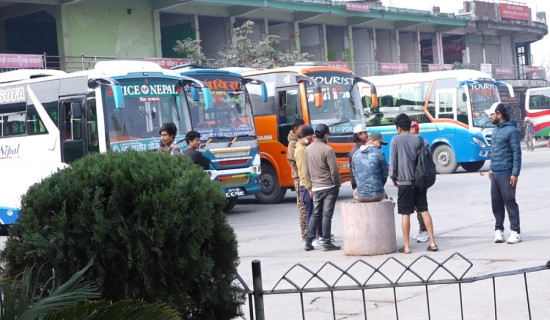- Wednesday, 4 March 2026
Tribute To Martyrs
On Tuesday, Nepal observed the Martyrs’ Day with a variety of programmes. Martyrs are remembered for their relentless struggles and sacrifices for the broader cause of the people and nation. Martyrs are those, who endure persecution and defy death while fighting for freedom, dignity, justice, democracy and equality. Nepal's political history is replete with great martyrs who fought against various autocratic systems, and inspired the commoners to wage ceaseless movements and revolutions to bring about transformative changes in the society. Therefore, it is the duty of all, including citizens and the government to pay tribute to them. On the day, great martyrs - Shukra Raj Shastri, Dharma Bhakta Mathema, Ganga Lal Shrestha and Dasharath Chand – were paid heartfelt respects as their sacrifices eventually fuelled a landmark revolution that toppled Rana rule in 1951, ten years after they were sentenced to death. Also called sat salko kranti, the 1951 revolution was considered the mother of all political movements and agitations launched in the subsequent years.
The day highlights the importance of the pledges made by the political parties, the government and civil society. This is done to make the dreams and views of the martyrs come true, so that they lead to lasting peace, good governance, development, and prosperity. During the martyrs' week, stories of wounded and martyrs' families facing economic hardships pour in. It's the government's role to strengthen, reach out to, and address their needs. Despite political parties honouring martyrs yearly, their actions seem disconnected from the ideals for which sacrifices were made. It may help nurture democracy, the rule of law and effective service delivery. However, challenges persist in consolidating public institutions essential for functional democracy.
Martyrs should not be declared on the basis of narrow political interests. This dishonours those who genuinely sacrificed for the country. While celebrating Martyrs Day, the government must ensure true heroes get proper recognition. Those who died for democracy and citizens' freedom deserve national respect. There was a shift in the manner in which the government regards martyrs. There should be unambiguous criteria to bestow the status of a martyr. The announcement of the monetary compensation for martyrs' families has led to unclear rules regarding eligibility and criteria. According to the Ministry of Home Affairs, the government has finalised the names of 11,419 martyrs, and their names have been officially published. Nevertheless, since the names of the rest of the 3,261 martyrs need public homage, their distinctive titles are yet to be known. Valuing the collective good, preserving democracy, and working for the people and the nation will truly honour martyrs.
Paying tribute to martyrs through words is meaningful, but tangible actions must follow the promise made in words. The commitment to the well-being of the martyrs' families should translate into policies, ensuring economic stability and social recognition. Political parties must set aside their differences for the larger cause of safeguarding the nation and democracy. This responsibility extends to citizens actively participating in the democratic process to ensure martyrs' sacrifices do not go in vain. In conclusion, Martyrs Day serves as more than a day of remembrance; it is a collective call to action. It urges the nation to uphold the values for which the martyrs sacrificed their lives. The stories of the martyrs should be passed down to future generations, not merely as historical narratives but as a source of inspiration for a nation striving for a better future.
















